组织行为学英文PPT
合集下载
组织行为学 OrganizationBehaviorPPT课件
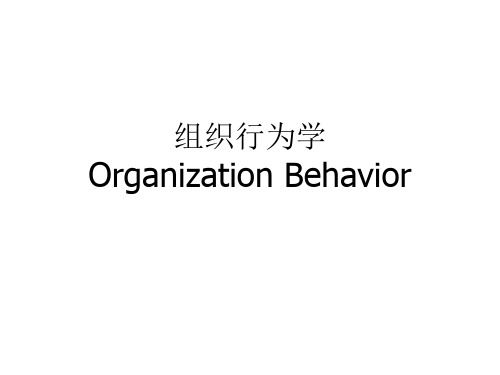
4、态度的形成
• 认知失调理论:
5、工作满意度
• 什么决定工作满意度
• 1、心理挑战性的工作 2、公平的报酬 3、支持性的工作环境 4、融洽的同事关系 5、人格与工作匹配
工作满意度对员工绩效的影响
• 满意度与生产率 • 满意度与缺勤率 • 满意度与流动率
员工如何表达他的不满
• 退出 • 建议 • 忠诚 • 忽略
激励因素
满意--------没有满意
保健因素
(赫茨伯格观点)
没有不满意------不满意
ERG理论
阿尔得夫把马斯洛的需要层次论压缩为: 1、生存需要 2、相互关系需要 3、成长发展需要
成就需要理论
基本内容 1、权力需要。权力包括个人权力和社会权力两种。 2、友谊需要。友谊需要包括管理活动中和个人生活 中的友谊的需要。 3、成就需要。这种需要是指对成就的追求。有成就 需要的人,对胜任和成功有强烈的愿望。
• 2、能力的分类: 1)心理能力: 2)体质能力:
3、能力-工作的匹配
• 掌握好各类职工的能力标准,合理 招聘人才
• 根据能力差异,实施不同的教育培 训
• 根据能力差异,合理分工 • 全面了解能力特点,贯彻正确的用
人原则
三、学习
• 学习是由于经验而发生的相对持久的行 为变化。 行为的变化表明了学习的发生,学习 是行为的改变。
• 艺术型的人:这种类型的人喜欢文学和艺术, 善于用艺术作品来表现自己,感情丰富、爱想 象、富有创作性,相应的职业有:作家、画家、 雕刻家、音乐家。
• 企业型的人:这种类型的人富有冒险精神、性 格外向、喜欢担任领导工作,具有说服、支配、 使用语言等能力,相应的职业有:经理、推销 员、经纪人、公关小姐等。
罗宾斯 组织行为学精要(英文版第14版)教学课件_ppt12

Charismatic Leadership
• Charismatic leadership theory: Attributions of heroic leadership abilities when followers observe certain behaviors – Vision and articulation – Personal risk taking – Sensitivity toward followers – Unconventional behaviors
• GLOBE Leadership Project Results: – Brazil – Leaders are participative and humane – France – Leaders are bureaucratic, task oriented, and
autocratic
– China – Initiating structuant:
Copyright © 2018, 2016, 2014 Pearson Education, Inc. All Rights Reserved.
Fiedler Leadership Model
• Least-Preferred Co-worker (LPC) determines leadership style (fixed trait) – Relationship oriented – Task oriented
tasks are ambiguous or stressful
– Supportive leadership results in high performance and
satisfaction when tasks are structured
组织行为学LeadershipPPT课件
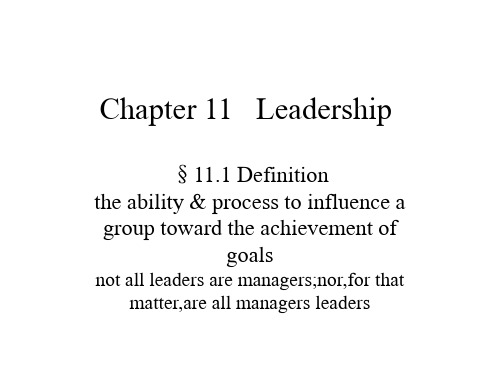
trait research were successful,then leader is basically inborn, would have provided a basis for
selecting the right “leader” behavior theories were valid,we could teach
• 3rd separate dimension: values experimentation,seeking new ideas,& generating & implementing change.
• Went back & look at the original Ohio data, -wasn’t critical in those days; positive evident in 1990s dynamic environment.
What makes an effective leader
• the 1st approach sought to find universal personality traits that leaders had to some great degree than nonleaders
• explain leadership in terms of the behavior a person engaged in
power variables such as-• Matching leaders & situation:favorable I,II,iii,Vii,Viii;
change the leader to fit the situation; change the situation to fit the leader
selecting the right “leader” behavior theories were valid,we could teach
• 3rd separate dimension: values experimentation,seeking new ideas,& generating & implementing change.
• Went back & look at the original Ohio data, -wasn’t critical in those days; positive evident in 1990s dynamic environment.
What makes an effective leader
• the 1st approach sought to find universal personality traits that leaders had to some great degree than nonleaders
• explain leadership in terms of the behavior a person engaged in
power variables such as-• Matching leaders & situation:favorable I,II,iii,Vii,Viii;
change the leader to fit the situation; change the situation to fit the leader
组织行为学英文课件 (22)
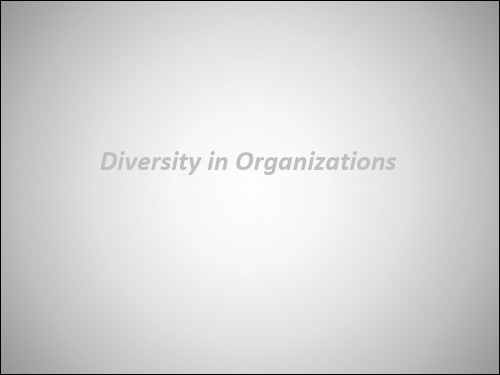
Summary and Managerial Implications
– Diversity Management
• Must be an ongoing commitment at all levels of the organization.
• Policies must include multiple perspectives and be long term in their orientation to be effective.
intelligence. • Wonderlic Personnel Test: a quick measure of intelligence for
recruitment screening. • No correlation between intelligence and job satisfaction.
Diversity in Organizations
Chapter Learning Objectives
Ø After studying this chapter, you should be able to:
– Describe the two major forms of workforce diversity. – Define the key biographical characteristics and describe how
Ø Religion
– May impact the workplace in areas of dress, grooming and scheduling
Ø Sexual Orientation
– Federal law does not protect against discrimination (but state or local laws may).
组织行为学英文课件 (16)

Informal Groups
Ø Interest Group
– Members work together to attain a specific objective with which each is concerned
Ø Friendship Group
– Those brought together because racteristics
Ø Role Conflict
– A situation in which an individual is confronted by divergent role expectations
Zimbardo’s Prison Experiment
Ø Faked a prison using student volunteers
Defining and Classifying Groups
Ø Group:
– Two or more individuals interacting and interdependent, who have come together to achieve particular objectives
Temporary groups with deadlines don’t follow the fivestage model ØPunctuated-Equilibrium Model
– Temporary groups under deadlines go through transitions between inertia and activity—at the halfway point, they experience an increase in productivity.
组织行为学(ppt255页)(英文版).pptx

Attitudes
Types of Attitudes
The Theory of Cognitive Dissonance
Desire to reduce dissonance
• Importance of elements creating dissonance • Degree of individual influence over elements • Rewards involved in dissonance
Planning
Organizing
Management Functions
Controlling
Leading
Management Functions (cont’d)
Management Functions (cont’d)
Management Functions (cont’d)
Management Functions (cont’d)
Self-Perception Theory
An Application: Attitude Surveys
Sample Attitude Survey
EXHIBIT
3-5
Job Satisfaction
➢ Measuring Job Satisfaction
– Single global rating – Summation score
4. Networking
• Socializing, politicking, and interacting with others
Allocation of Activities by Time
E X H I B I T 1-2
Enter Organizational Behavior
OrganizationalBehavior组织行为学 ppt课件
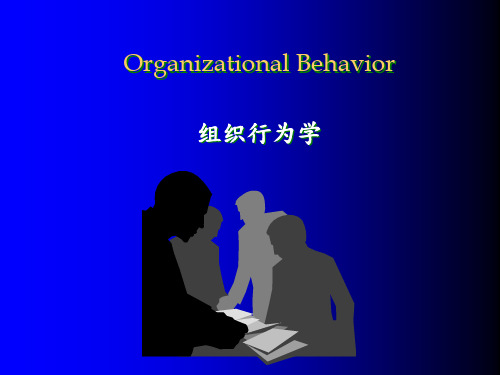
动作 与 角 色
10
What Do Managers Do ?
2020/12/27
11
管理者的工作和角色
管理的功能观
管理的角色观
1. 计划 2. 组织 3. 领导 4. 控制
2020/12/27
• 人际角色
➢ 头面人物 ➢ 领导者 ➢ 联络者
• 决策者
➢ 创业者 ➢ 混乱处理者 ➢ 资源分配者
➢ 谈判者
• 信息传递角色
➢ 传播者
➢ 发言人
技能观 1. 技术技能 2. 人际技能 3. 概念技能
12
Managerial Activities
传统 的管理
社会交往
传统 的管理
13%
沟通
11% 19%
48%
28%
11%
26% 44%
社会交往
人力资源管理
202S0/u12c/2c7essful managers
2.
个体水平变量
2. Group-level variables
群体水平变量
3. Organization-level variables
组织水平变量 缺勤率
2020/12/27
The dependent
1. 生产率 2. Turnover 流动率 3. Absenteeism
4. Job satisfaction 22
7
第一章 绪论
2020/12/27
8
Learning Objectives 学习目标
➢ 了解组织行为学
➢ 组织行为学的研究框架
➢ 确认对组织行为学有贡献的学科
➢ 组织行为学的研究方法
➢ 组织行为学与人力资源管理
10
What Do Managers Do ?
2020/12/27
11
管理者的工作和角色
管理的功能观
管理的角色观
1. 计划 2. 组织 3. 领导 4. 控制
2020/12/27
• 人际角色
➢ 头面人物 ➢ 领导者 ➢ 联络者
• 决策者
➢ 创业者 ➢ 混乱处理者 ➢ 资源分配者
➢ 谈判者
• 信息传递角色
➢ 传播者
➢ 发言人
技能观 1. 技术技能 2. 人际技能 3. 概念技能
12
Managerial Activities
传统 的管理
社会交往
传统 的管理
13%
沟通
11% 19%
48%
28%
11%
26% 44%
社会交往
人力资源管理
202S0/u12c/2c7essful managers
2.
个体水平变量
2. Group-level variables
群体水平变量
3. Organization-level variables
组织水平变量 缺勤率
2020/12/27
The dependent
1. 生产率 2. Turnover 流动率 3. Absenteeism
4. Job satisfaction 22
7
第一章 绪论
2020/12/27
8
Learning Objectives 学习目标
➢ 了解组织行为学
➢ 组织行为学的研究框架
➢ 确认对组织行为学有贡献的学科
➢ 组织行为学的研究方法
➢ 组织行为学与人力资源管理
组织行为学英文课件 (1)
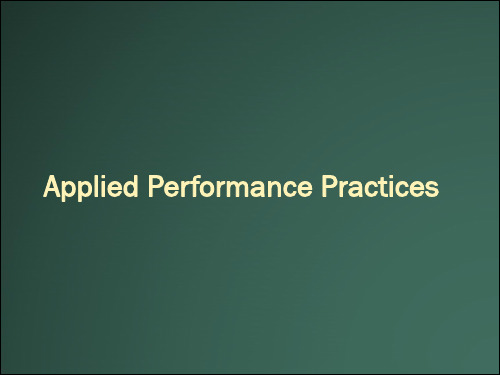
Job ‘A’ Job ‘D’
Job ‘B’
Job ‘C’
6-17
Job Enlargement
§ Adding tasks to an existing job § Example: video journalist
Traditional news team
Video journalist
• Operates camera • Operates sound • Reports story
§ Disadvantages
• Potentially subjective, higher training costs
6-7
Reward Practices at Nucor
Courtesy Nucor
Nucor has survived and thrived in the turbulent steel industry by motivating employees with team-based and organizational-based rewards.
§ Men value money more than women § Cultural values influence the meaning
and value of money
© Corel Corp. With permission.
6-3
Types of Rewards in the Workplace
§ Less time changing activities
§ Lower training costs
§ Job mastered quickly
§ Better person-job matching
- 1、下载文档前请自行甄别文档内容的完整性,平台不提供额外的编辑、内容补充、找答案等附加服务。
- 2、"仅部分预览"的文档,不可在线预览部分如存在完整性等问题,可反馈申请退款(可完整预览的文档不适用该条件!)。
- 3、如文档侵犯您的权益,请联系客服反馈,我们会尽快为您处理(人工客服工作时间:9:00-18:30)。
14
Core Abilities of the Managing Ethics Competency
Identify and describe the principles of ethical decision making and behavior Assess the importance of ethical issues in actions Apply laws, regulations, and organizational rules in making decisions and taking action Demonstrate dignity and respect for others Demonstrate honest and open communication limited only by legal, privacy, and competitive considerations 15
8
Core Abilities of the Managing Communication Competency
Convey information, ideas, and emotions so they are received as intended Provide constructive feedback Engage in active listening Use and interpret nonverbal communication effectively Engage in effective verbal communication Engage in effective written communication Effectively use electronic communication resources 9
6
Five Aspects of a Career*
Career success or failure is best determined by the individual, in terms of his/her personal goal achievement No absolute career evaluation standards exist Examine a career subjectively (e.g., values and personality fit) and objectively (e.g., job choices, competencies needed) Make decisions about occupation and pursue activities to attain career goals throughout your lifetime Consider cultural factors as they impact performance and career opportunities 7
2
Sevengically integrated set of competencies required for managerial and professional effectiveness in the 21st century This model developed by Hellriegel, Slocum, and Woodman for this textbook Other models of such competencies have been developed by other authors
Chapter 1 Learning About Organizational Behavior
What is Organizational Behavior? Seven Foundation Competencies
Managing Self Managing Communication Managing Diversity Managing Ethics Managing Across Cultures Managing Teams Managing Change
Career Development*
A career is a sequence of work-related positions occupied by a person during a lifetime. Career development involves making decisions about an occupation and engaging in activities to attain career goals. A career plan is an individual’s choice of occupation, organization, and career path.
Selected Categories of Diversity*
Genetic characteristics that affect a persons self-image and socialization, appear to be unlearned and are difficult to modify
Involves the ability to incorporate values and principles that distinguish right from wrong in making decisions and choosing behaviors
13
Ethics
Definition: Values and principles that distinguish right from wrong. NOT IN TEXT: Ethics are often based upon laws, organizational policies, social norms, family, religion, and/or personal needs, and may be subject to differing interpretations with problems in proving “truth” Ethical Dilemma*: A situation in which an individual or team must make a decision that involves multiple values.
Education, work experience, income, marital status, religious beliefs, geographic location, parental status, behavioral style 12
Definition of the Managing Ethics Competency
4
Core Abilities of the Managing Self Competency
Understand the personality and attitudes of yourself and others Perceive, appraise, and interpret accurately yourself, others, and the immediate environment Understand and act on your own and others work-related motivations and emotions Assess and establish developmental, personal/life-related, and work-related goals Take responsibility for managing yourself and your career 5
10
Core Abilities of the Managing Diversity Competency
Foster an environment of inclusion for all Learn from others with different characteristics, experiences, perspectives, and backgrounds Embrace and support diversity Work with others because of their talents and contributions, rather than personal attributes Provide leadership in addressing diversity-based conflicts Apply diversity laws, regulations, and organizational policies related to your position 11
Definition of the Managing Communication Competency
Involves the ability to use all the modes of transmitting, understanding, and receiving ideas, thoughts, and feelings, (verbal, listening, nonverbal, written, electronic, etc.) for accurately transferring and exchanging information and emotions
Organizations as Open Systems [Not in Text]
1
What is Organizational Behavior?
Definition: The study of human behavior, attitudes, and performance in organizations. Value of OB: Helps people attain the competencies needed to become effective employees, team leaders/members, or managers Competency = an interrelated set of abilities, behaviors, attitudes, and knowledge needed by an individual to be effective in most professional and managerial positions
